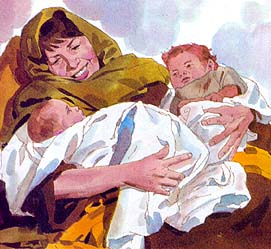1 & 2 Chronicles gives us a different perspective on the story of Israel so far. It is written by an exiled priest, possibly Ezra, who will be one of the first to return to the land after 70 years of exile. “Ezra” recollects and reflects theologically on the events of Israel’s life, seeking to identify God’s sovereign hand at work in it all.
1 Chronicles is mostly about King David, Israel’s greatest king. You’ll remember that despite his great heroics, like slaying the giant Goliath, David committed the sins of adultery and murder. He was far from a perfect man. Yet David loved the Lord and showed sincere sorrow for his sins. In addition, he did not lead Israel into idolatry like so many other kings of Israel. God showed him grace and honored him by choosing his family line (the tribe of Judah) to be the family line of the Messiah, Jesus.
Chapters 1-9 serves as an introduction and is all about roots. King David’s story, like the story of the whole human race, begins with Adam, and moves forward to the story of Noah and the flood judgment because of universal human sin. From there we come to the people at the forefront of God’s promise of redemption–Abraham, Isaac and Jacob. Jacob’s twelve sons eventually become the tribes that make up the nation and finally the Kingdom of Israel.
Genealogies for the twelve tribes are then presented, beginning–not surprisingly–with Judah, King David’s tribe. Next the genealogy for the priestly tribe of Levi is featured, followed by the others.
In chapter 9, the writer takes us to the exile, focusing on the Kingdom of Judah, and then to the time when some of the exiles are permitted to go back to homes in Jerusalem, and to the little that remained of the destroyed Temple.
“The first of the exiles to return to their property in their former towns were priests, Levites, Temple servants and other Israelites.” (1 Chronicles 9:2)
It is from their perspective that the story of King David, and what follows, is to be told.
Yes, it is boring reading, so what’s the point? We’ve seen that the heart of the story of God and his creation is his desire to have a relationship with you and me, a relationship that God faithfully pursues despite our continued rebellion and idolatry. We run from God, seeking other gods of our own making, and he runs after us. His gracious plan to make things right involves God making promises to individuals, like Abraham, Isaac, Jacob, Moses, and David, who will (imperfectly) become his agents of redemption.
By keeping track of all these people, we are reminded of how faithful God has been to keep his promises, even when we could have cared less. How amazing that God will not let us go!
Prayer: Lord, there are so many facets to the events of our lives, and many possible interpretations. But though we don’t always understand what is going on because we can’t see the big picture of your plan, we are grateful that you faithfully keep after us, offering your presence, granting us blessings, and taking us to a glorious future with you in the New Creation. Amen!

